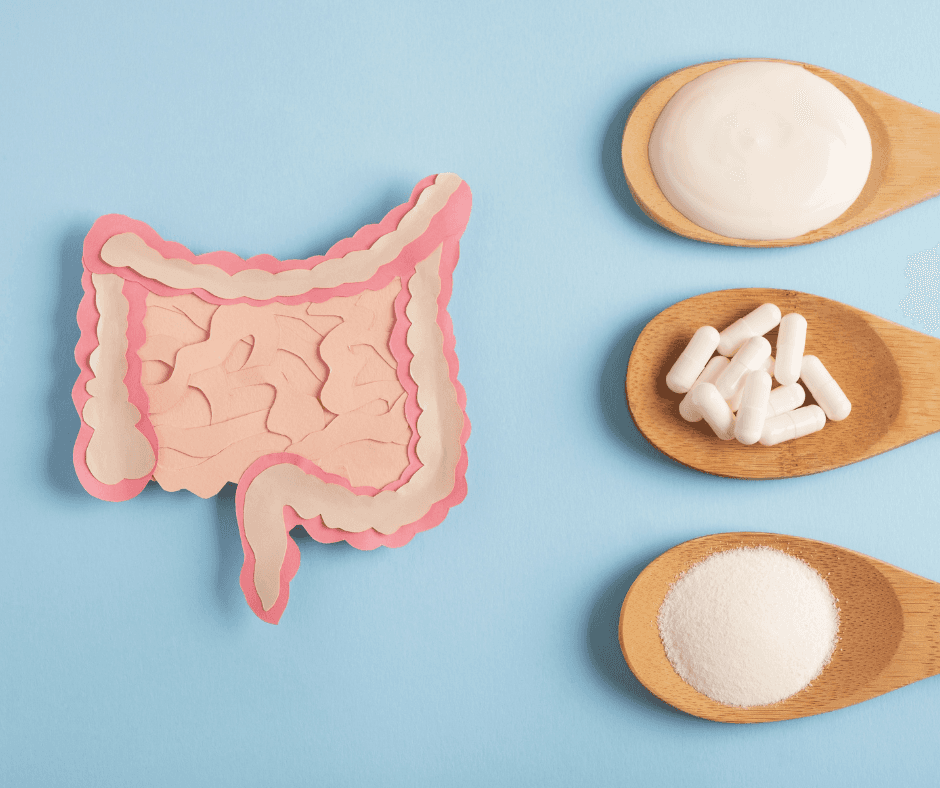How your gut health influences the brain, mood, and sleep
How your gut health influences the brain, mood, and sleep
How your gut health influences the brain, mood, and sleep
Mar 21, 2024
Mar 21, 2024

Explore a curiosa conexão entre o intestino e a saúde geral. Entenda como um intestino saudável pode melhorar a função cerebral, regular o humor e o sono, e diminuir o risco de doenças.
Explore a curiosa conexão entre o intestino e a saúde geral. Entenda como um intestino saudável pode melhorar a função cerebral, regular o humor e o sono, e diminuir o risco de doenças.
Explore a curiosa conexão entre o intestino e a saúde geral. Entenda como um intestino saudável pode melhorar a função cerebral, regular o humor e o sono, e diminuir o risco de doenças.
Way beyond digestion, the intestine plays a silent leading role in regulating our health. Recent research reveals a bidirectional communication between the gut and the brain, known as the gut-brain axis, highlighting the importance of intestinal microbiota in our well-being. Next, we'll delve into this relationship to discover how a healthy intestine can be the key to a vigorous body and mind.
The science behind the gut-brain axis
The bidirectional interaction between the gut and the brain involves a complex network of communication that includes nervous, hormonal, and immune signals. This axis is essential for brain function, influencing everything from stress perception to decision-making.
Research indicates that the gut microbiota not only impacts the production of neurotransmitters, such as serotonin, but can also directly and indirectly affect the nervous system. Studies in animal models suggest that spore-forming bacteria in the intestine can stimulate serotonin production, although the exact mechanisms of this influence on the brain are still being explored.
Furthermore, intestinal health can impact the immune system, which in turn can influence the central nervous system. This suggests that some communication pathways between the gut and the brain may be independent of the immune and nervous systems.
Happy Gut, Happy Mind: The Link Between Microbiota and Mood
The relationship between the gut and mental health, also known as the "second brain," is an increasingly attention-grabbing area of research. The gut houses virtually all serotonin production, the hormone of satisfaction and well-being, and influences the production of other neurotransmitters, such as GABA (gamma-aminobutyric acid), which aids in fear and anxiety control.
Disorders in the intestinal flora, such as dysbiosis, which causes an imbalance between beneficial and harmful microorganisms, may be linked to various psychiatric and neurological conditions, including depression, anxiety, epilepsy, and even neurodegenerative diseases such as Alzheimer's and Parkinson's. Diets rich in fiber, vegetables, fruits, and healthy fats, such as those found in fish and olive oil, may promote a diverse and healthy microbiota, while diets rich in refined sugars, saturated fats, and processed foods may contribute to dysbiosis and, by extension, mental health problems.
Although we are still in the early stages of understanding the exact mechanisms behind the gut-brain relationship, current evidence points to a future where regulating the intestinal flora could be an integral part of treating mental disorders.
Deep Rest: The Importance of the Intestine for Quality Sleep
The connection between the quality of sleep and the intestinal microbiota resembles its connection with mental health. The bacterial community communicates with the brain through a network of neurons in the gastrointestinal tract, known as the enteric nervous system. This bidirectional relationship means that one affects the function of the other.
Studies have shown that a reduction in beneficial bacteria can affect the duration of sleep, while persistent sleep disturbances and alterations in the circadian rhythm can cause an imbalance in the microbiota. One possible explanation for this influence is the chemicals produced by the bacteria. For example, butyrate, a fatty acid found in dairy products, asparagus, oats, garlic, and onion, contains molecules that induce sleep. It is produced by the fermentation of dietary fiber by the microbiota, reinforcing the belief that a healthy diet promotes better sleep.
As mentioned earlier, the intestinal microbiota produces serotonin, dopamine, and GABA, neurotransmitters that directly influence the quality of sleep. When the production of these neurotransmitters decreases, sleep becomes irregular, increasing the risk of [diseases](https://www.cdc.gov/sleep/about_sleep/chronic_disease.html#:~:text=Persons with sleep apnea have,their peers without sleep abnormalities.) cardiovascular, depression, obesity, and diabetes. In addition, the fatigue resulting from poorly slept nights impairs cognitive performance, increasing the likelihood of occupational errors, injuries, and traffic accidents.
Intestine and Overall Health: How Intestinal Microbiota Reduces the Risk of Diseases
The intestinal microbiota contributes to maintaining the intestinal barrier and modulating the body's inflammatory response. A healthy microbiota helps preserve the integrity of the intestinal wall, preventing "intestinal permeability". This condition allows harmful substances to enter the bloodstream, triggering inflammation, a known precursor of various chronic diseases.
Furthermore, research suggests that the intestinal microbiota can influence the body's metabolism and weight regulation. Certain intestinal bacteria can affect how the body stores fat, responds to insulin, and even regulates the sensation of hunger and satiety, directly implicating in the prevention and management of type 2 diabetes and obesity.
Interestingly, the composition of the intestinal microbiota varies from person to person, depending on factors such as diet, lifestyle, antibiotic use, and exposure to microorganisms since birth. This variation indicates that personalized interventions, such as dietary adjustments, supplementation with probiotics and prebiotics, and other lifestyle changes, can optimize microbiota health and, consequently, promote better overall health.
Strategies to Strengthen Intestinal Health
Incorporate fiber into your diet: Increase the intake of vegetables, fruits, and whole grains. The fiber in these foods feeds beneficial bacteria, promoting digestion and nutrient absorption.
Introduce prebiotics and probiotics: Consume foods rich in prebiotics to nourish beneficial bacteria, and fermented foods to introduce healthy bacteria into the digestive system.
Use antibiotics in moderation: Use antibiotics only when prescribed and necessary. They may reduce the diversity of the microbiome by killing beneficial and harmful bacteria.
Manage stress: Practice stress reduction techniques (such as yoga, meditation, or exercise) to minimize their negative effects on the intestinal microbiota.
Stay hydrated: Drink plenty of water to facilitate digestion, nutrient absorption, and waste passage.
Limit alcohol and processed foods: Reduce alcohol consumption and avoid processed and sugar-rich foods, as they can cause inflammation and harm the intestinal bacterial balance.
Intestinal health is a fundamental pillar of overall health and well-being. Through understanding and nurturing our microbiota, we can enjoy benefits that go far beyond digestion, positively influencing our mood, cognitive ability, and disease resistance. Caring for the intestine is therefore caring for the whole body and mind.
Way beyond digestion, the intestine plays a silent leading role in regulating our health. Recent research reveals a bidirectional communication between the gut and the brain, known as the gut-brain axis, highlighting the importance of intestinal microbiota in our well-being. Next, we'll delve into this relationship to discover how a healthy intestine can be the key to a vigorous body and mind.
The science behind the gut-brain axis
The bidirectional interaction between the gut and the brain involves a complex network of communication that includes nervous, hormonal, and immune signals. This axis is essential for brain function, influencing everything from stress perception to decision-making.
Research indicates that the gut microbiota not only impacts the production of neurotransmitters, such as serotonin, but can also directly and indirectly affect the nervous system. Studies in animal models suggest that spore-forming bacteria in the intestine can stimulate serotonin production, although the exact mechanisms of this influence on the brain are still being explored.
Furthermore, intestinal health can impact the immune system, which in turn can influence the central nervous system. This suggests that some communication pathways between the gut and the brain may be independent of the immune and nervous systems.
Happy Gut, Happy Mind: The Link Between Microbiota and Mood
The relationship between the gut and mental health, also known as the "second brain," is an increasingly attention-grabbing area of research. The gut houses virtually all serotonin production, the hormone of satisfaction and well-being, and influences the production of other neurotransmitters, such as GABA (gamma-aminobutyric acid), which aids in fear and anxiety control.
Disorders in the intestinal flora, such as dysbiosis, which causes an imbalance between beneficial and harmful microorganisms, may be linked to various psychiatric and neurological conditions, including depression, anxiety, epilepsy, and even neurodegenerative diseases such as Alzheimer's and Parkinson's. Diets rich in fiber, vegetables, fruits, and healthy fats, such as those found in fish and olive oil, may promote a diverse and healthy microbiota, while diets rich in refined sugars, saturated fats, and processed foods may contribute to dysbiosis and, by extension, mental health problems.
Although we are still in the early stages of understanding the exact mechanisms behind the gut-brain relationship, current evidence points to a future where regulating the intestinal flora could be an integral part of treating mental disorders.
Deep Rest: The Importance of the Intestine for Quality Sleep
The connection between the quality of sleep and the intestinal microbiota resembles its connection with mental health. The bacterial community communicates with the brain through a network of neurons in the gastrointestinal tract, known as the enteric nervous system. This bidirectional relationship means that one affects the function of the other.
Studies have shown that a reduction in beneficial bacteria can affect the duration of sleep, while persistent sleep disturbances and alterations in the circadian rhythm can cause an imbalance in the microbiota. One possible explanation for this influence is the chemicals produced by the bacteria. For example, butyrate, a fatty acid found in dairy products, asparagus, oats, garlic, and onion, contains molecules that induce sleep. It is produced by the fermentation of dietary fiber by the microbiota, reinforcing the belief that a healthy diet promotes better sleep.
As mentioned earlier, the intestinal microbiota produces serotonin, dopamine, and GABA, neurotransmitters that directly influence the quality of sleep. When the production of these neurotransmitters decreases, sleep becomes irregular, increasing the risk of [diseases](https://www.cdc.gov/sleep/about_sleep/chronic_disease.html#:~:text=Persons with sleep apnea have,their peers without sleep abnormalities.) cardiovascular, depression, obesity, and diabetes. In addition, the fatigue resulting from poorly slept nights impairs cognitive performance, increasing the likelihood of occupational errors, injuries, and traffic accidents.
Intestine and Overall Health: How Intestinal Microbiota Reduces the Risk of Diseases
The intestinal microbiota contributes to maintaining the intestinal barrier and modulating the body's inflammatory response. A healthy microbiota helps preserve the integrity of the intestinal wall, preventing "intestinal permeability". This condition allows harmful substances to enter the bloodstream, triggering inflammation, a known precursor of various chronic diseases.
Furthermore, research suggests that the intestinal microbiota can influence the body's metabolism and weight regulation. Certain intestinal bacteria can affect how the body stores fat, responds to insulin, and even regulates the sensation of hunger and satiety, directly implicating in the prevention and management of type 2 diabetes and obesity.
Interestingly, the composition of the intestinal microbiota varies from person to person, depending on factors such as diet, lifestyle, antibiotic use, and exposure to microorganisms since birth. This variation indicates that personalized interventions, such as dietary adjustments, supplementation with probiotics and prebiotics, and other lifestyle changes, can optimize microbiota health and, consequently, promote better overall health.
Strategies to Strengthen Intestinal Health
Incorporate fiber into your diet: Increase the intake of vegetables, fruits, and whole grains. The fiber in these foods feeds beneficial bacteria, promoting digestion and nutrient absorption.
Introduce prebiotics and probiotics: Consume foods rich in prebiotics to nourish beneficial bacteria, and fermented foods to introduce healthy bacteria into the digestive system.
Use antibiotics in moderation: Use antibiotics only when prescribed and necessary. They may reduce the diversity of the microbiome by killing beneficial and harmful bacteria.
Manage stress: Practice stress reduction techniques (such as yoga, meditation, or exercise) to minimize their negative effects on the intestinal microbiota.
Stay hydrated: Drink plenty of water to facilitate digestion, nutrient absorption, and waste passage.
Limit alcohol and processed foods: Reduce alcohol consumption and avoid processed and sugar-rich foods, as they can cause inflammation and harm the intestinal bacterial balance.
Intestinal health is a fundamental pillar of overall health and well-being. Through understanding and nurturing our microbiota, we can enjoy benefits that go far beyond digestion, positively influencing our mood, cognitive ability, and disease resistance. Caring for the intestine is therefore caring for the whole body and mind.
Way beyond digestion, the intestine plays a silent leading role in regulating our health. Recent research reveals a bidirectional communication between the gut and the brain, known as the gut-brain axis, highlighting the importance of intestinal microbiota in our well-being. Next, we'll delve into this relationship to discover how a healthy intestine can be the key to a vigorous body and mind.
The science behind the gut-brain axis
The bidirectional interaction between the gut and the brain involves a complex network of communication that includes nervous, hormonal, and immune signals. This axis is essential for brain function, influencing everything from stress perception to decision-making.
Research indicates that the gut microbiota not only impacts the production of neurotransmitters, such as serotonin, but can also directly and indirectly affect the nervous system. Studies in animal models suggest that spore-forming bacteria in the intestine can stimulate serotonin production, although the exact mechanisms of this influence on the brain are still being explored.
Furthermore, intestinal health can impact the immune system, which in turn can influence the central nervous system. This suggests that some communication pathways between the gut and the brain may be independent of the immune and nervous systems.
Happy Gut, Happy Mind: The Link Between Microbiota and Mood
The relationship between the gut and mental health, also known as the "second brain," is an increasingly attention-grabbing area of research. The gut houses virtually all serotonin production, the hormone of satisfaction and well-being, and influences the production of other neurotransmitters, such as GABA (gamma-aminobutyric acid), which aids in fear and anxiety control.
Disorders in the intestinal flora, such as dysbiosis, which causes an imbalance between beneficial and harmful microorganisms, may be linked to various psychiatric and neurological conditions, including depression, anxiety, epilepsy, and even neurodegenerative diseases such as Alzheimer's and Parkinson's. Diets rich in fiber, vegetables, fruits, and healthy fats, such as those found in fish and olive oil, may promote a diverse and healthy microbiota, while diets rich in refined sugars, saturated fats, and processed foods may contribute to dysbiosis and, by extension, mental health problems.
Although we are still in the early stages of understanding the exact mechanisms behind the gut-brain relationship, current evidence points to a future where regulating the intestinal flora could be an integral part of treating mental disorders.
Deep Rest: The Importance of the Intestine for Quality Sleep
The connection between the quality of sleep and the intestinal microbiota resembles its connection with mental health. The bacterial community communicates with the brain through a network of neurons in the gastrointestinal tract, known as the enteric nervous system. This bidirectional relationship means that one affects the function of the other.
Studies have shown that a reduction in beneficial bacteria can affect the duration of sleep, while persistent sleep disturbances and alterations in the circadian rhythm can cause an imbalance in the microbiota. One possible explanation for this influence is the chemicals produced by the bacteria. For example, butyrate, a fatty acid found in dairy products, asparagus, oats, garlic, and onion, contains molecules that induce sleep. It is produced by the fermentation of dietary fiber by the microbiota, reinforcing the belief that a healthy diet promotes better sleep.
As mentioned earlier, the intestinal microbiota produces serotonin, dopamine, and GABA, neurotransmitters that directly influence the quality of sleep. When the production of these neurotransmitters decreases, sleep becomes irregular, increasing the risk of [diseases](https://www.cdc.gov/sleep/about_sleep/chronic_disease.html#:~:text=Persons with sleep apnea have,their peers without sleep abnormalities.) cardiovascular, depression, obesity, and diabetes. In addition, the fatigue resulting from poorly slept nights impairs cognitive performance, increasing the likelihood of occupational errors, injuries, and traffic accidents.
Intestine and Overall Health: How Intestinal Microbiota Reduces the Risk of Diseases
The intestinal microbiota contributes to maintaining the intestinal barrier and modulating the body's inflammatory response. A healthy microbiota helps preserve the integrity of the intestinal wall, preventing "intestinal permeability". This condition allows harmful substances to enter the bloodstream, triggering inflammation, a known precursor of various chronic diseases.
Furthermore, research suggests that the intestinal microbiota can influence the body's metabolism and weight regulation. Certain intestinal bacteria can affect how the body stores fat, responds to insulin, and even regulates the sensation of hunger and satiety, directly implicating in the prevention and management of type 2 diabetes and obesity.
Interestingly, the composition of the intestinal microbiota varies from person to person, depending on factors such as diet, lifestyle, antibiotic use, and exposure to microorganisms since birth. This variation indicates that personalized interventions, such as dietary adjustments, supplementation with probiotics and prebiotics, and other lifestyle changes, can optimize microbiota health and, consequently, promote better overall health.
Strategies to Strengthen Intestinal Health
Incorporate fiber into your diet: Increase the intake of vegetables, fruits, and whole grains. The fiber in these foods feeds beneficial bacteria, promoting digestion and nutrient absorption.
Introduce prebiotics and probiotics: Consume foods rich in prebiotics to nourish beneficial bacteria, and fermented foods to introduce healthy bacteria into the digestive system.
Use antibiotics in moderation: Use antibiotics only when prescribed and necessary. They may reduce the diversity of the microbiome by killing beneficial and harmful bacteria.
Manage stress: Practice stress reduction techniques (such as yoga, meditation, or exercise) to minimize their negative effects on the intestinal microbiota.
Stay hydrated: Drink plenty of water to facilitate digestion, nutrient absorption, and waste passage.
Limit alcohol and processed foods: Reduce alcohol consumption and avoid processed and sugar-rich foods, as they can cause inflammation and harm the intestinal bacterial balance.
Intestinal health is a fundamental pillar of overall health and well-being. Through understanding and nurturing our microbiota, we can enjoy benefits that go far beyond digestion, positively influencing our mood, cognitive ability, and disease resistance. Caring for the intestine is therefore caring for the whole body and mind.















